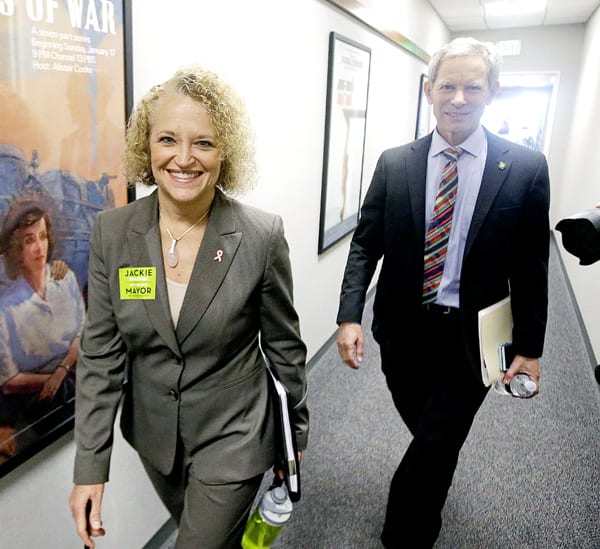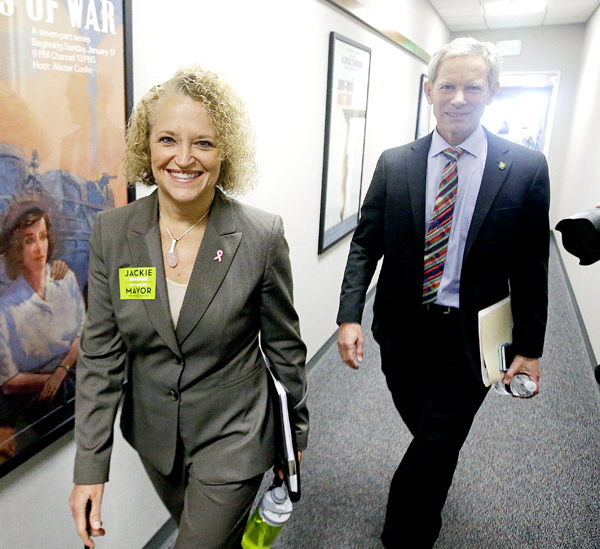Despite high-profile HERO defeat in Houston, there were some Election Day victories for LGBTs
Lisa Keen | Keen News Service
lisakeen@mac.com
Even though Houston’s — and Texas’ — LGBT community is reeling today (Wednesday, Nov. 4) in the wake of the defeat of that city’s equal rights ordinance, there were some surprise victories in conservative strongholds around the country on Election Day, with 30 of 48 openly LGBT candidates winning election Tuesday night.
In Salt Lake City, Utah, Jackie Biskupski appears to have become the first openly gay person to be elected mayor of the Mormon conservative stronghold, taking 52 percent of the vote. As of Wednesday morning, incumbent Mayor Ralph Becker had refused to concede the race, even though Biskupski also beat him soundly during the primary in August.
The Salt Lake City Tribune endorsed Biskupski, citing her 13 years in the Utah Legislature and her current work in the sheriff’s office.
Biskupski proudly included her work for LGBTQ citizens in her campaign material. Many of her supporters and campaign workers wore long, curly blond wigs in an affectionate mocking of Biskupski’s wildly curly mop.
Also in Salt Lake City, Derek Kitchen, one of the plaintiffs in that state’s lawsuit seeking the right to marry, appears to have won his bid to join the city council, with 52 percent of the vote.
In South Bend, Ind., incumbent Mayor Pete Buttigieg won 80 percent of the vote for a second term Tuesday, less than five months after coming out as gay. But Associated Press noted there was only “scant discussion” of his sexual orientation by his opponent during the campaign.
And in Indianapolis, the city’s first openly gay city councilmember, Zach Adamson, won re-election Tuesday. Since his first election, Adamson garnered considerable media attention when he and his partner traveled to Washington, D.C., to marry because they couldn’t get a license in Indiana.
Earlier this year, Adamson joined the Council majority in urging the Indiana Legislature to repeal its law allowing discrimination against LGBT people by claiming a religious motivation.
Other hopes of “firsts” in conservative areas were denied Tuesday. Jocelyn Pritchett, a Democrat from Jackson, Miss., was the first openly LGBT candidate for a statewide position in that state. She ran against incumbent Republican Stacey Pickering for the job of sate auditor.
According to campaign finance reports, Pritchett raised more than $146,000 in her bid, compared to Pickering’s $300,000. But Pritchett won the endorsement of the Clarion-Ledger newspaper, which made noted that the incumbent was under federal investigation for his management of state contracts and his campaign finances.
Pritchett, noted the paper, was a “credible” candidate with 25 years working with state and federal contracts. It did not mention that she has the endorsement of the Gay & Lesbian Victory Fund.
But Prichett took only 36 percent of the vote to Pickering’s 63 percent.
In neighboring North Carolina, three-term gay incumbent Mayor Mark Kleinschmidt lost his re-election campaign in Chapel Hill. Kleinschmidt, only the third openly gay elected official in the state, won only 45 percent of the vote. His challenger described herself as a “moderate Democrat” and seemed to capitalize on an anti-incumbent trend.
Chapel Hill’s openly gay Councilmember Lee Storrow also lost his re-election bid, garnering only 10 percent of the vote.
Openly gay incumbent Houston Councilmember Lane Lewis lost his seat Tuesday night, coming in sixth out of eight candidates for one at-large office.
But fellow gay councilmembers Mike Laster and Robert Gallegos came in first for their districts.
Anti-incumbency was not the mood in Charlotte, North Carolina, where two openly gay councilmembers easily won re-election. Lesbian LaWana Mayfield secured a third term with 76 percent of the vote. Her fellow gay councilmember, Al Austin, won re-election with 79 percent.
During his campaign, Austin was asked by the Charlotte Observer, whether he would support expansion of the city’s non-discrimination ordinance, “including a provision that would allow transgender residents to use the bathroom of their choice.”
Austin said yes and added, “There are many more incidents of members of the transgender community who experience assault and battery when they are not allowed to use the bathroom with which they self-identify.”
Ginny Deerin, one of six candidates for mayor of Charleston, S.C., was hit with a much more direct anti-gay campaign.
The founder of an after school program for kids from families with low incomes, Deerin was also the former campaign manager for the city’s popular retiring mayor and in good position to win. But one week before voting, someone mailed out postcards that informed voters that Deerin was gay, according to the Charleston City Paper.
The rainbow-colored card purported to come from “The Lesbian Gay Bisexual Transgender Association” — an organization that does not exist in Charleston or South Carolina. Deerin’s campaign called it a “vile last-minute personal attack from an anonymous group.”
And Deerin received only 17 percent of votes, coming in third overall.
Anti-gay tactics may have been in play in another campaign, in New York, but in this case, to no avail: Steve Napier became the first openly gay elected official in Cohoes, N.Y., taking 49 percent of the vote in a three-way race.
Napier, a Democrat, won a seat on the town’s Common Council despite his opponent’s decision to note on a campaign flyer that she is married to a man named Dave and has two sons, while Napier is married to a man named Jeremy and had no children.
The local newspaper, the Times Union, called candidate Sharon Gariepy out on her attempt to highlight Napier’s sexual orientation for her own personal gain.
“At worst,” said the paper, “it’s a deliberate attempt to suggest that Napier’s marriage is inferior, or to warn voters … that [Napier] is married to another man.” Gariepy said she supports marriage for gay couples and didn’t intend anything negative from including that on her campaign flyer.
Palm Springs Councilmember Ginny Foat raised more campaign money than any of the other seven candidates for mayor in that city, but still came in second.
On the other hand, both openly gay candidates for the Palm Springs City Council won: gay activist Geoff Kors and former Sausalito Mayor J.R. Roberts.
Foat and Kors were endorsed by the Gay & Lesbian Victory Fund.
Two gay Republicans won Tuesday: Reed Gusciora won a state assembly seat in New Jersey, and Michael Esteve became the first openly gay Republican to win an elected office in Maryland, winning a seat on the Bowie City Council.
According to the Gay & Lesbian Victory Fund, there were 472 openly LGBT elected officials going into Tuesday’s voting. Most of those, 286, are local elected officials. Another 179 hold statewide offices, and seven are members of Congress.
© 2015 Keen News Service. All rights reserved.



